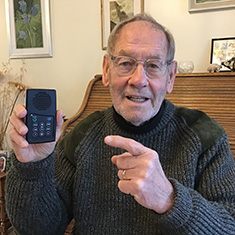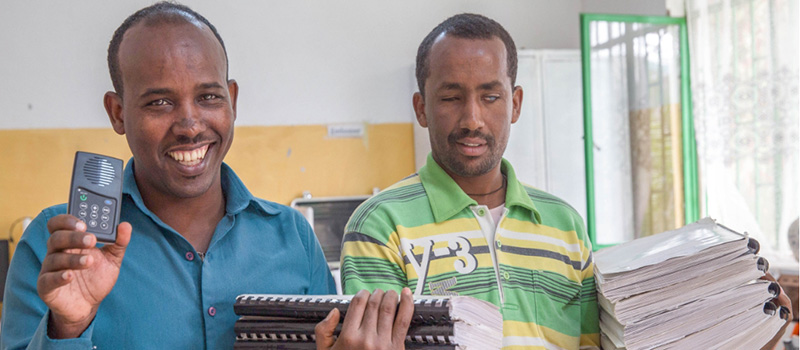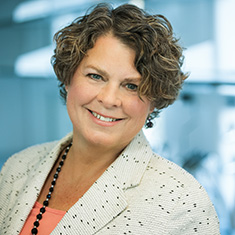Wall Award 2024 projects addressing pressing global issues
December 18, 2024 — Three globally compassionate projects developed by Grinnell College graduates have been selected for the 2024 Joseph F. Wall ’41 Alumni Service Awards.
Gary Knamiller ’61, Hansi Dean ’84, and Alexa Ryer ’20 are the award recipients. They will use the $40,000 prizes to address personally meaningful projects in the fields of special needs education in Ethiopia, Afghan evacuees’ resettlement, and the legal process for Ukrainian sexual violence survivors.
The award is named in honor of Joseph F. Wall ’41, professor of history and longtime dean of the College, who inspired the ideal of social responsibility in his students. It was established as part of the College’s sesquicentennial celebration as a tribute to Grinnell’s tradition of social commitment among its alums.
Each year, a committee composed of alumni (including previous Wall Award recipients), a student, and faculty members reviews applications and awards the $40,000 grants to either jump-start or complete a project that shows creativity and commitment to effecting positive social change.
During the past 28 years, the Wall Service Award has been presented to 71 individuals who have contributed their time and talents to 64 diverse projects throughout the U.S. and 22 other countries. These are the first projects in Ethiopia and Ukraine. The College has given out more than $1 million to alumni through this award program.
The following is a closer look at the projects of this year’s recipients.
Gary Knamiller ’61
 Gary Knamiller ’61
Gary Knamiller ’61
Knamiller’s project is to place an audio textbook player in the hands of each blind and partially sighted student and teacher in grades 5-12 in the Tigray Province of Ethiopia.
“Although it is wonderful that Ethiopia has a progressive policy of inclusive education for additional needs children to attend mainstream schools, blind students had little access to the curriculum,” Knamiller says. “They had to rely on their impressive memories and their sighted friends reading the textbook to them.”
The Talking Textbook program changed all that, Knamiller says. “Most people in Tigray, as in many areas of Ethiopia, are low-income, subsistence farmers. There is little electricity, which most assistive learning devices need. Our audio textbook players are solar powered. And they can hold six to eight recorded textbooks, enough for one grade level.”
When Knamiller and his wife retired, they joined the British Voluntary Service Overseas (VSO) and worked in teacher training and science curriculum development in Ethiopia from 2003-2006. It was then that they got to know the VSO volunteers who went on to set up Special Education Needs Ethiopia-UK in 2013.
Knamiller, who lives in England, is the UK talking textbook coordinator for the organization. The program began experimentally in 2014 and developed into a Tigray-wide operation from 2016 to 2020 serving over 250 blind and partially sighted students and teachers each year. “For four successful years our audio textbook players were a godsend for our blind students and teachers,” Knamiller says. “As one student said, ‘My audio textbook player has given me back my eyesight.’”
 Masho, left, and Abel are two blind students taking part in the Talking Textbook program. All of the textbooks Abel is holding up have been programmed into the audio player Masho is holding.
Masho, left, and Abel are two blind students taking part in the Talking Textbook program. All of the textbooks Abel is holding up have been programmed into the audio player Masho is holding.
But then the pandemic hit followed by a two-year, horrific civil war. Peace was declared in November 2022, but schools didn’t fully open again until September 2023. “Although we have been able to make contact with 257 of our former blind students and teachers, almost all the audio textbook players were either lost or broken,” he says.
The award money will be used to help relaunch the Talking Textbook program. It will provide for 150 MP3 players and the technical staff to record and upload the textbooks as well as distribute, train, monitor, and evaluate the program as they have done in the past. Some of the award money may also be used for developing information materials for parents of visually impaired children and to cover the remaining funding needed for the construction of a new girls’ dormitory at the Mekelle School for the Blind.
Hansi Dean ’84
 Hansi Dean ’84
Hansi Dean ’84
Dean is part of a nondenominational group of approximately 35 committed volunteers formed in late 2021 to support Afghan evacuees who were resettling in Manchester, New Hampshire and Lowell, Massachusetts. One of the group’s projects is called Sewing Seeds for Hope, a collaboration of Afghan women artisans who create handcrafted items to sell, which creates economic empowerment.
Afghan women are likely to feel isolated and depressed after resettlement in the U.S., Dean says. Most women did not have the opportunity to get an education, and few speak English.
“Most of the women we serve self-report trauma in their lives in Afghanistan, endless war, fear of the Taliban, a harrowing departure, misinformation about life in America, and stress in adapting to a completely different culture,” Dean says.
Dean will use the Wall Award funding to expand participation in the economic empowerment program and develop a literacy program for a larger group of Afghan evacuee women. This will also include incorporating training sessions by a professional seamstress in machine embroidery, serging, and sewing American-style garments and other high-value products.
“We aim to help Afghan women feel empowered and confident as they navigate life in America,” Dean says.
“It’s hard to imagine how anyone could follow the events of the war in Afghanistan, followed by the frantic evacuation of U.S. allies, and not be moved,” she added. “I feel that, as Americans, we have a moral obligation to support our Afghan allies. As an American woman, it is impossible to conceive of what life is like in Afghanistan for women and heartbreaking to see the small, hard-won gains for women over the past 20 years be erased in an instant. The Afghan women I have come to know are a daily inspiration. I am honored to walk beside them through their struggles, grief, strength, resiliency, hope, and even joy. I am motivated by the possibility that Afghan women in the U.S. can hope and dream for a better future for themselves and their daughters.”
Alexa Ryer ’20
 Alexa Ryer ’20
Alexa Ryer ’20
Ryer’s project is to establish and equip rooms in three National Police Departments of Ukraine as a place to conduct interviews with survivors of gender-based violence or conflict related sexual violence.
Since the outbreak of war in February 2022, Ukraine has reported numerous cases of conflict related sexual violence committed against Ukrainian civilians by members of the Russian armed forces. This troubling trend, combined with the simultaneous increase in domestic violence, and risk factors that accompany large scale internal displacement, means that many Ukrainians are now experiencing, or are at risk of experiencing, sexual violence at rates much higher than before the war, Ryer says.
“Gender based violence has greatly intensified for Ukrainian women, the reasons mainly being the lack of security, the absence of rule of law, the impunity of the perpetrators, and the stigma attached to revealing instances of sexual and gender-based violence,” she says.
Since 2022, Ryer has been the program coordinator for Europe and Eurasia at Vital Voices Global Partnership in Washington D.C. She has worked extensively on programing relating to gender-based violence prevention.
The Wall Award will allow Ryer to a work with a local Ukrainian organization – NGO Resource Center – to implement a three-step plan.
First, the project will establish specialized interview rooms for survivors of conflict related sexual violence in Ukrainian police stations. Second, NGO Resource Center will perform a training on interview best practices and survivor-centered interview approaches for police officers performing interviews in these specialized rooms. Finally, members of the legal system (including prosecutors, investigators, and judges) who will interact with survivors during the trial process will also receive training in survivor-centered approaches.
“Together these three activities will aim to harmonize and improve experience within the legal process for survivors from first report through the trial process,” Ryer says. “By improving the interview and legal process experience for survivors, it will not only reduce re-traumatization, but also encourage more survivors to come forward and testify.”
In all three projects, Grinnellians are addressing issued made worse by wars.
“We often hear that the Grinnell experience is essential to improving the world,” says Sarah Smith-Benanti, associate director of alumni and donor relations, diverse communities. “The three Wall Award recipients have really taken that ethos to heart. These projects will immensely benefit three global communities that have had to live through tremendous conflict.”
—by Jeremy Shapiro